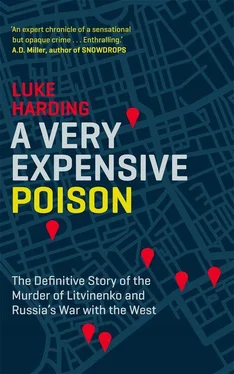What was unusual was that they would go on to rule the Russian Federation.
* * *
Litvinenko’s 2006 report amounted to an eight-page hand grenade, tossed into the control room of Russian power. It was written for RISC management, a British security company based in London. RISC specialised in due diligence. This meant carrying out extensive checks on Russian firms and prominent individuals at the behest of western businesses. Such reports involved a mixture of official and more sensitive secret sources.
Litvinenko provided the detail on the St Petersburg mafia and its activities in the 1990s. Another exile actually wrote the report, a former KGB major called Yuri B. Shvets. Shvets was everything that Putin and Ivanov weren’t. He was an intelligent and enterprising secret agent blessed with literary gifts. Tall, handsome, and with a sweeping mane of dark black hair, he looked every inch the romantic spy abroad. The KGB had recruited him in 1980, inviting him to join its prestigious external intelligence service, the First Chief Directorate.
Shvets had studied at the Patrice Lumumba People’s Friendship University in Moscow. It was, he wrote, a surprisingly liberal institution by the standards of the late USSR, which attracted young men and women from ninety different countries. He described himself in his memoir as ‘neither a convinced communist nor a dissident’. Not all of the university’s students were so politically ambivalent: one of Shvets’s predecessors was a Marxist-Leninist from Venezuela named Ilich Ramirez Sanchez. Sanchez, Shvets wrote later, was not your typical student, spending most of his time away and abroad. He would become better known as the terrorist Carlos the Jackal.
After graduation, Shvets spent two years at the Yuri Andropov Red Banner Intelligence Institute. The KGB training school was based in a pleasant forest in Yurlovo, not far from Moscow. There, he said, he was taught the secrets of the trade. He learned from legendary spymasters who had worked with the Cold War’s most famous western defectors – the Rosenbergs, who stole the US’s atomic secrets, and the upper-class Cambridge spy ring, Kim Philby, Guy Burgess and Donald Maclean.
Shvets also did a two-month training stint with a Spetsnaz or special forces unit. He parachuted from planes, learned how to handle a variety of weapons and to plant mines. He was taught how to blow up bridges and to interrogate enemy prisoners. He learned guerrilla tactics. He was instructed not to think or query the state. Shvets recalled how one wiry paratrooper colonel told him: ‘Your duty is to execute, at any cost, any task assigned by our motherland.’
One of Shvets’s classmates at the KGB academy was Putin. Putin had grown up in a working-class family in Leningrad; an older brother died during the Nazi siege of the city; his grandfather was Lenin’s cook. As a teenager he learned judo to defend himself from neighbourhood toughs. From an early age he aspired to join the KGB, inspired – he later said – by the Soviet TV spy drama The Shield and the Sword. He studied law. The KGB recruited him in 1975 after he finished Leningrad University.
Putin’s world view reflected the a priori thinking of the KGB. The agency was suspicious, paranoid and prone to conspiratorial reasoning. Putin was convinced that the US and the western world were engaged in an unsleeping plot against the Soviet Union.
Virtually all the graduates from the KGB institute got jobs afterwards in the first directorate and were sent to foreign ‘residencies’, as the KGB termed its covert offices abroad. For reasons which are mysterious, Putin didn’t make the grade, Shvets believed. ‘Putin belonged to the 1 per cent of losers. He was sent back to St Petersburg,’ he said later. Others say Putin went back to his home city and was given the task of recruiting foreigners on Soviet soil. In 1984, Putin did eventually get a foreign assignment. After a second year-long stint at the institute he was moved to Dresden, in the GDR.
Between 1985 and 1987, Shvets found himself in the more glamorous setting of Washington, under journalistic cover at the Soviet embassy. He was a correspondent for TASS, the Russian news agency. He became disillusioned with the Soviet Union and, in particular, the KGB. By the 1980s, the KGB had virtually no sources in the west, he thought; instead, its operatives churned out a series of meaningless reports for incompetent and risk-averse bureaucrat-generals back at the ‘centre’ in Moscow.
Shvets quit the KGB in 1990 and sought political asylum in the US. From there he published a lively espionage memoir, Washington Station: My Life as a KGB Spy In America , which described his successful recruitment of an unnamed American agent, codenamed ‘Socrates’. He began writing due-diligence reports for American corporations seeking to cash in on the new post-communist Russia.
One of the skills Shvets learned at KGB school was analysis: how to craft and present the perfect intelligence report. Often it would include a psychological pen-portrait of a target. The best of these telegrams were done with swift, compressed strokes.
The Litvinenko–Shvets dossier on Ivanov fitted this model. Under a heading titled ‘personal characteristics’, it described Ivanov as ‘a very complex man with [a] difficult personality’. It went on to say: ‘He is masterful at understanding the balance of forces around him, identifies the latent leaders (very important in the surreal world of Russian bureaucracy) and is highly capable of using his knowledge to his personal benefit.’ If offended, Ivanov could become your ‘worst enemy’. He had a ‘vindictive’ streak and would try to identify and then ‘punish’ anyone who leaked ‘negative information’ about him.
It ended: ‘Many representatives of the new generation of the Russian leaders view Ivanov as a remnant of the past who fits more to Joseph Stalin times than to the modern environment. A source who worked with Ivanov told us that Ivanov apparently has a latent complex of inferiority. He apparently realises that he is not intellectually smart and compensates this by Byzantine-style intrigue, in which he feels himself on his turf.’
Litvinenko and Shvets were a good team. Shvets had a wide network of intelligence sources inside Russia who provided him with real information. Litvinenko, meanwhile, had worked for the FSB in the 1990s in the department tasked with fighting organised crime. He had direct knowledge of its operations. Litvinenko’s English was poor, but Shvets, a long-term resident of the US, could write in fluent sentences. They worked together via email and phone calls from America to Britain.
On 19 September 2006, Litvinenko gave the eight-page report to RISC. Litvinenko also passed a copy of the report to another man, a Moscow-based business partner whom he had no reason to mistrust: one Andrei Lugovoi. Doing this was clearly dangerous, but Litvinenko had known the wealthy businessman for over ten years, had been working closely with him for the previous twelve months and believed him to be trustworthy. They had similar backgrounds: both were ex-KGB, moved in Berezovsky’s circle and apparently shared grievances against the Russian state. Indeed, Litvinenko had previously commissioned Lugovoi to write his own version of a dossier on Viktor Ivanov. When it arrived from Moscow, this second Lugovoi report was ‘trash’, RISC felt – inferior to Shvets’s classy document and a mere half-page of A4. Litvinenko handed Lugovoi Shvets’s version while Lugovoi was on one of his frequent business trips to London to show him how it might be done.
Clearly, if the Litvinenko–Shvets report ever fell into the hands of the Kremlin it would provoke anger. Serious anger. Branding Ivanov a vindictive monster was one thing. But implicating Russia’s president in shady deals with the St Petersburg mafia and Colombian drug smugglers was another. There were plenty of general reasons why the Kremlin might want Litvinenko dead. But this report on its own was certainly a strong enough motive to have him killed, British detectives were to conclude.
Читать дальше












